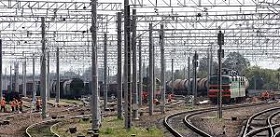Cargo, EU – Baltic States, Lithuania, Oil, Railways, Transport
International Internet Magazine. Baltic States news & analytics
Wednesday, 24.04.2024, 02:39
Orlen says wants to pay no more than other Lithuanian Railways customers
 Print version
Print version |
|---|
"Our
expectations in the talks are based on LG's official tariffs. We want to pay no
more than other LG customers, especially given that we are the company's
biggest freight shipment customer," said Orlen Lietuva spokesman Tomas
Digaitis.
The
spokesman said that Orlen Lietuva had
not yet received a response from the state railway operator to the crude
refinery's proposal.
"We are very
surprised to see information in the media that our expectations are higher than
before. We are also surprised by their (LG) comments on alleged additional
contexts in our relations," he said.
LG Deputy CEO Albertas Simenas told that Orlen Lietuva had asked for tens of
millions of euros worth of discounts on rail freight rates. In his words, the
amount of discounts sought by the crude refinery is three to four times higher
than it was in the spring, and the talks, therefore, are in a deadlock.
Simenas
also said that that this could be the price for Poland's position not to hamper
Lithuania's strategic energy projects, particularly the Baltic grids'
synchronization with the Western European system.
Prime
Minister Algirdas Butkevicius told
that the government would not accept Orlen's demands if that might plunge the
railway operator into losses.
Butkevicius
has admitted earlier that a deal between LG and Orlen would make it simpler for
Lithuania to speak with Poland about energy projects.
Orlen Lietuva and LG disagree over a freight transportation contract
that they signed back in 2009 and that is effective until in 2024.
Relations
between the companies went sour in 2014 following the government's decision to
change how infrastructure fees are calculated. As a result of this decision,
fees for dangerous goods, including oil products, increased.








 «The Baltic Course» Is Sold and Stays in Business!
«The Baltic Course» Is Sold and Stays in Business!

